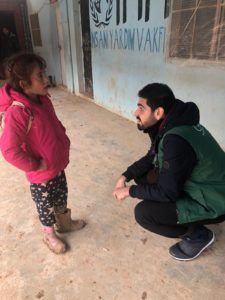 Blogs
Blogs
March 9, 2021 • 4 min read
Nasser Alhiraky works on the front line for GOAL in Aleppo, north west Syria. He addressed the Oireachtas Joint Committee on Foreign Affairs on the eve of the 10th anniversary of the Syrian conflict.
I was born and raised in Aleppo in Syria. After graduating from Ebla University in Banking and Financial Science, and before the start of the war, I volunteered with the Red Crescent in Aleppo. I continued my humanitarian work in Aleppo during the first two years of the conflict.
In August 2013, after the arbitrary arrest of my 15-year-old brother, Nahel, and following continuous pressure on my family from the security forces, we had to flee our home, and arrived in Turkey.
It was not easy at first, to learn a new culture, a new language, and to start a new life. We really hoped we could eventually go back to our country.
In my role with GOAL as an Area Coordinator I travel between Turkey and Northwest Syria every week, to work with our programme beneficiaries, our local staff, and our implementing partners.
We work in Idleb and Northern Aleppo, within an area that is roughly the size of County Galway in Ireland. More than 4 million people live in Idleb and Northern Aleppo, under fear of shelling and bombardment.
Over half of this population was displaced to this area, from all across the country. Many had to escape conflict several times. Women and children make up the largest part of this population.
In each location I visit, I meet people who were forced to leave their home. People who lost family members, relatives, and friends.
Over half a million civilians lost their lives in this war. More than 400 humanitarian aid workers were reported killed in the last 10 years, but I suspect this number may be much higher. At GOAL, we lost 4 of our colleagues.
Memories of loss are countless, and each person is a dictionary of pain stories. You can’t imagine how many times the people I meet were forced to leave different locations, to be away from attacks, but faced the cold in the streets, with no access to shelter or food.
We in GOAL strive to provide humanitarian assistance for the most vulnerable people in this area.
We help deliver clean piped water. We supply food, basic needs, and emergency relief to these communities who have nothing to fall back on, communities who have to survive the harsh winter weather and the Coronavirus outbreak in unfinished buildings, or in crowded camps.
Last year, GOAL and partners reached more than 1.3 million people in Idleb and Northern Aleppo with food assistance. Around 1 million of this population also received water from the 66 water stations that GOAL has supported and that supply 123 locations in Idleb.
But this situation cannot go on for much longer. Unless a peaceful solution to the conflict is found, no amount of humanitarian aid will be enough.
Yet the coordinated delivery of humanitarian assistance is also at risk now. Ireland has a unique role to play today, in making a difference for millions of people in Syria who have no means of survival other than humanitarian aid.
As a penholder of the humanitarian file for Syria on the UN Security Council, and as one of world’s foremost peacekeepers, Ireland can stress the importance of an immediate solution to the conflict, and work to ensure that aid delivery corridors are kept open.
Ireland on the UN Security Council
If the UN Security Council decides to stop mandating the only remaining cross-border humanitarian aid corridor into Northwest Syria in July, the timely and efficient delivery of assistance will be very difficult to maintain.
The UN’s coordinating role will end, and international humanitarian funding for Northwest Syria, which is already in decline, may decrease further.
Mark Lowcock, the UN Emergency Relief Coordinator, recently noted that efforts to establish a cross-line delivery mechanism from Damascus to Northwest Syria have not been successful.
From my experience of humanitarian work in Aleppo in the first two years of the war, this is not surprising.
I also know that the families I meet in Northwest Syria will find it difficult to accept assistance that is overseen from Damascus, given they have suffered so much from war planes that come from the same direction.
I am aware that this is only part of the discussion, and that the UN Security Council decision will be debated behind closed doors, between countries that may be diplomatic rivals.
But, as someone who sees the growing hardship on the ground every week, I can only stress that humanitarian access should follow humanitarian need and not politics.
Ireland now has the opportunity to be the voice of humanitarianism in the Security Council – to speak with humanitarians, for humanitarians, and for humanity.
Perhaps the voice of compassion alone will not end this crisis. But this voice might help to make sure that we can ease the suffering of people who have nowhere to escape.
Each and every day these families have to live through the distress of bombs falling from the sky; of not knowing where their next meal will come from; and of trying to heat their shelter so that their children can survive the winter.
They have no opportunity to change the conditions in which their children are growing up.
You can support GOAL’s work in Syria with a donation today.
